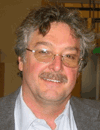Dieter Gruenert,
Professor,
University of California San Francisco
Dieter C. Gruenert, Ph.D.: Dieter C. Gruenert, Ph.D., is a Professor in the Departments of Otolaryngology-Head and Neck Surgery and Laboratory Medicine at UCSF as well as in the Department of Pediatrics at the University of Vermont. He received his Ph.D. in Biophysics from the University of California, Berkeley in 1982. His postdoctoral studies (1982-1984) were in the Department of Carcinogenesis at the Swiss Institute for Experimental Cancer Research. Prior to his present position, he was a Professor of Laboratory Medicine and the Co-Director of the Gene Therapy Core Center at UCSF (1992-1999), Professor of Medicine and Director, Division of Human Molecular Genetics at the University of Vermont (2000-2003), and a Senior Scientist and Head of the Stem Cell Research Program at the California Pacific Medical Center (2003-2010). His research emphasis is on human cell and molecular biology, nucleic acid delivery, and the development of gene, pharmacological, and cell-based therapies for the treatment of inherited diseases and cancer. His work has led to the development of novel diagnostic and oligo/polynucleotide-based therapeutic strategies to ameliorate disease pathology, as well as to numerous human epithelial cell systems now used in academic and industrial labs throughout the world. His work focuses on development of adult, embryonic, and induced pluripotent stem cells as well as development of novel approaches for generating immortalized cell systems to study the biochemical, molecular, and metabolic mechanisms underlying disease progression and to develop pharmacological, genetic, and/or regenerative therapies. He has > 140 publications and holds 5 patents. Dr. Gruenert is on the Editorial Boards of several scientific journals including Molecular Therapy, Molecular Therapy Nucleic Acids, Pharmaceutical Sciences, and Current Drug Discovery, and he is a Senior Editor of Nucleic Acids Therapeutics. He reviews grants for numerous public and private agencies both nationally and internationally including the NIH, the DOD, the VA, the Maryland and Connecticut Stem Cell Programs, the CF Foundation, the Medical Research Council, the German, Italian, and French CF Foundations, the Italian, German and French Ministry of Health/Science. He currently serves on the Ethics Committee (Chair, 2005-2008) and the Oligonucleotide-based Therapy Committee of the ASGCT and was awarded a European Respiratory Society Visiting Professorship at Necker Sick Children's Hospital in Paris (2009) and holds an ongoing Visiting Professorship at Tor Vergata University in Rome. He has consulted for such biotech and pharma firms as Bayer, Boehringer Mannheim, Boehringer Ingelheim, Promega, AMAXA, and Discovery BioMed.
|

|

 Add to Calendar ▼2013-01-22 11:15:002013-01-22 12:15:00Europe/LondonOrgan/Tissue-specific Human Cell Systems for Development of Novel Therapies SELECTBIOenquiries@selectbiosciences.com
Add to Calendar ▼2013-01-22 11:15:002013-01-22 12:15:00Europe/LondonOrgan/Tissue-specific Human Cell Systems for Development of Novel Therapies SELECTBIOenquiries@selectbiosciences.com Add to Calendar ▼2013-01-22 00:00:002013-01-23 00:00:00Europe/LondonCell CultureSELECTBIOenquiries@selectbiosciences.com
Add to Calendar ▼2013-01-22 00:00:002013-01-23 00:00:00Europe/LondonCell CultureSELECTBIOenquiries@selectbiosciences.com